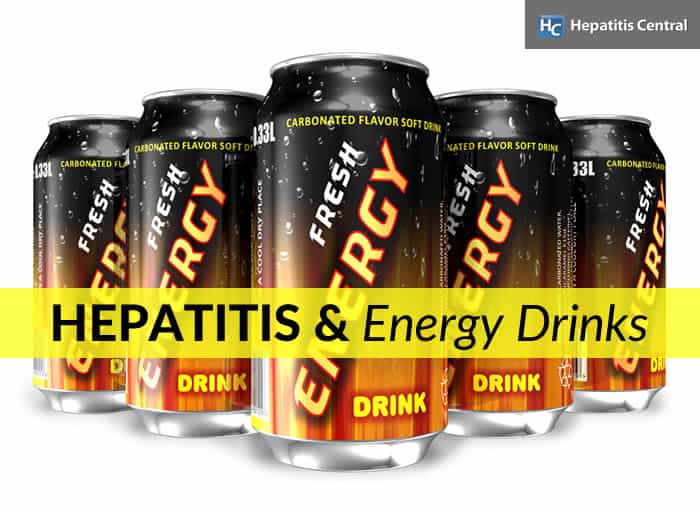Hepatitis and Energy Drinks


Most of us know what it’s like to attempt to function despite being exhausted; the energy drink industry counts on it. While many people consume energy drinks because they are tasty and help them get through a long day, this beverage’s potential harm to the liver is relatively unknown. Spurred by a recent case published in the journal BMJ Case Reports, excessive energy drink consumption may contribute to hepatitis – inflammation of the liver.
Next to multivitamins, energy drinks are the most popular dietary supplement consumed by American teens and young adults. Almost one third of teenagers between 12-17 years old consume energy drinks regularly, according to the National Center for Complementary and Integrative Health (NCCIH). Unfortunately, the high sugar and caffeine content of energy drinks typically disqualify them from being healthful. In addition, people frequently don’t heed serving size recommendations for beverages – especially a beverage considered to be good for you.
Although not the first time this has been documented, the latest case of a liver problem caused by energy drink consumption was reported by Dr. Jennifer Nicole Harb and colleagues of the University of Florida College of Medicine. According to the report:
- A 50-year-old man who worked long, labor-intensive days, developed acute hepatitis from excessive energy drink consumption.
- Before becoming sick from liver toxicity, the subject was in good health and abstained from tobacco, alcohol and illicit drugs.
- The subject drank four to five energy drinks a day for three weeks before he was hospitalized.
- Each bottle of the subject’s energy drink contained 40 mg of niacin, or 200 percent of the recommended daily value; and he consumed four or five bottles daily for more than 21 days.
- Niacin can cause transaminitis, an indicator of liver damage, in up to 20 percent of people who have 500 milligrams of niacin daily. Although the subject only ingested about 200 mg of niacin each day, the duration of three weeks may have created a cumulative effect.
- Lab tests in the hospital revealed that the man had chronic Hepatitis C.
- A biopsy showed that the subject’s liver damage was non-specific, meaning the damage was caused by drugs or toxins – not the Hepatitis C virus.
- Energy drinks are not a source of viral hepatitis, like Hepatitis C.
- The subject’s blood revealed levels of serum folate and vitamin B12 that exceeded quantifiable limits.
- Both serum folate and B12 are common ingredients in energy drinks that can accumulate in the liver and become toxic when consumed in excess.
- The attending medical workers concluded that the subject’s liver injury was directly related to excessive consumption of energy drinks.
The energy drink industry is big business, and its popularity and variety continues to grow. Regrettably, most consumers do not consider drinking more than one per day as a dangerous activity. The subject of the case report now knows that excessive vitamin intake can do similar harm as overdosing on illicit drugs. According to the case report’s authors, “As the energy drink market continues to rapidly expand, consumers should be aware of the potential risks of their various ingredients. Vitamins and nutrients, such as niacin, are present in quantities that greatly exceed the recommended daily intake, lending to their high risk for harmful accumulation and toxicity.”
There is still no conclusive evidence linking energy drinks to hepatitis. However, having chronic Hepatitis C was likely an aggravating factor for the man described in the case report. A liver infected with chronic Hepatitis C is engaged in a continual battle against the virus, and is therefore at a disadvantage when battling toxins. One would hardly consider B vitamins to be toxic in a normal situation, but they are in excessive amounts. In addition, the high quantities of sugar and caffeine in energy drinks can set people up for a major health crisis.
Luckily, the subject in the case study described above recovered fully after stopping his energy drink binge. Even so, his experience should serve as a warning to individuals who love energy drinks AND especially to those with Hepatitis C that consuming sugar, caffeine and even vitamins in excess can be harmful.
https://nccih.nih.gov/health/energy-drinks, Energy Drinks, Retrieved November 6, 2016, National Center for Complementary and Integrative Health, 2016.
http://onlinelibrary.wiley.com/store/10.1002/lt.22360/asset/22360_ftp.pdf;jsessionid=81ED39F008BBDF6408F921AD40C9685D.f04t03?v=1&t=iv7887ad&s=75696841fc75016c7eb8ea094a2cd82a3a3d7e9c, Energy Drinks: Another Red Flag for the Liver Allograft, CA Apestegui, MD, et al, Retrieved November 6, 2016, ‘Letter to the Editor’, Liver Transplantation, May 2011.
http://www.cnn.com/2016/11/02/health/energy-drinks-hepatitis?, Can energy drinks cause hepatitis?, Hailey Middlebrook, Retrieved November 6, 2016, Cable News Network, 2016.
http://www.eatingwell.com/nutrition_health/nutrition_news_information/10_common_energy_drink_ingredients, 10 Common Energy Drink Ingredients: What You Need to Know, Karen Ansel, MS, RD, Retrieved November 6, 2016, Meredith Corporation, 2016.
http://www.livestrong.com/article/408524-are-energy-drinks-bad-for-your-liver/, Are Energy Drinks Bad for Your Liver?, Adam Fonseca, Retrieved November 6, 2016, Demand Media, Inc., 2016.
http://www.medicalnewstoday.com/articles/313849.php, Energy drinks linked to hepatitis in new case study, Ana Sandoiu, Retrieved November 6, 2016, MediLexicon International Ltd., 2016.







